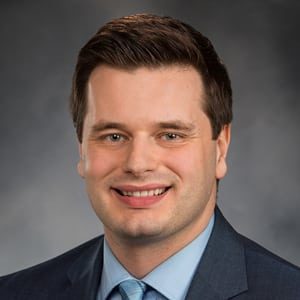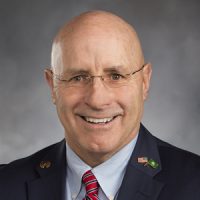
Home » Dueling marijuana bills at odds over who has authority to ban pot shops
Dueling marijuana bills at odds over who has authority to ban pot shops

February 15, 2018
By Michelle Dupler
A series of bills introduced in the Washington state Legislature highlight dueling approaches to marijuana regulation in the state — and spell possible uncertainty for cannabis businesses.
While Rep. David Sawyer, D-Tacoma, said a pair of bills he introduced aim to enhance state-level control over Washington’s legal cannabis market, Rep. Brad Klippert, R-Kennewick, wrote legislation that instead would give local governments more regulatory control and greater ability to ban pot businesses within their borders.
One bill introduced by Sawyer — House Bill 2336 — would only allow local governments to prohibit marijuana businesses through a public vote. And a recent amendment made in the House Committee on Commerce and Gaming, which Sawyer chairs, would require those elections to be held only in even-numbered years.
Under Sawyer’s bill, if a local government opted to enact a ban, it would apply across the board to all similar businesses, such as all marijuana retail shops.
On the flip side, Klippert introduced House Bill 2484, which would allow local governments the authority to enact bans under their own power and require that if a local government opts to pass such a ban, then the Washington State Liquor and Cannabis Board can’t renew the license of any marijuana business already operating in the jurisdiction or proposed to be opened there.

Klippert said HB 2484 is intended to address the controversial siting of a marijuana retail shop in an unincorporated “doughnut hole” of Benton County land surrounded by a West Richland residential neighborhood. Benton County chose not to enact a moratorium on marijuana businesses after Initiative 502 legalized use, sales and growth of the drug, even though a majority of county residents voted against the initiative.
That left little recourse for West Richland residents who felt the pot shop was a bad fit for their neighborhood in the area of Arena Road.
Bill Berkman, chairman of the Benton County GOP, said the uproar among residents is one reason he and other local party officials opted to travel to Olympia to testify at a public hearing on HB 2336.
“We have a lot of concerned citizens,” Berkman said. “They have been told by real estate brokers their property values are going to go down because nobody wants to be next to a pot shop.”
But since the shop wasn’t violating any zoning regulations or other laws, there was nothing residents could do.
The hope was that Sawyer’s bill would allow a public vote to abate a marijuana business that wasn’t a good fit with the surrounding community, but Berkman said the bill’s language didn’t offer that fix to the residents of West Richland since it only allowed residents of the specific jurisdiction where the business is located to vote — in other words, only residents of unincorporated Benton County.
“The real stakeholders are the residents of West Richland and yet they’re not able to vote on a measure calling for an abatement of a retail pot store,” Berkman said.
While the Benton County GOP neither supported nor opposed the bill in testimony at the public hearing in Olympia, Berkman said another issue he had with the bill is that it takes away local government control in favor of the state.
The bill specifically states that Washington state law preempts municipal ordinances or regulations regarding regulation of the production, processing, and retail sale of marijuana — a detail that Initiative 502 omitted.
According to the bill analysis provided by the Commerce & Gaming Committee staff, that led to litigation to answer the question whether cities and counties were pre-empted from enacting ordinances preventing or restricting state-licensed marijuana businesses from locating in their jurisdictions.
A few courts have ruled that local governments are not preempted from passing such ordinances, but Sawyer said that’s not what the initiative intended.
He said in speaking to attorneys for the Legislature, their interpretation was that the state preempted local governments when it came to regulating marijuana businesses.
“We are trying to fix what the initiative attempted to do,” he said.
HB 2336 was passed by the Commerce & Gaming Committee on Jan. 23 and is pending a decision by the Rules Committee whether it will be sent to a floor vote in the House.
Klippert’s bill, HB 2484, has not received a public hearing in the Commerce & Gaming Committee, and Sawyer said it will not. With no committee movement, the bill is effectively dead this session.
“I do not think his bills help this area he was attempting to help,” Sawyer said.
However, Sawyer said he would be willing to consider legislation in his committee that provided an effective fix for the West Richland problem.
Despite their opposing approaches, both lawmakers say they’re looking out for the best interests of Washingtonians.
“This is not about me. This is not about Brad getting his name in the paper,” Klippert said. “I do this because I care about the community I live in. If I see something harming the citizens I serve, I seek to protect them.”
And both see the black market as a problem that their legislation can help solve.
Klippert’s view is that I-502 is a failed experiment and that allowing local governments more control to enact bans would help quash the black market — and he’d overturn marijuana legalization if he could.
“Narcotics officers have told me the movement of illegal drugs is worse now since we legalized marijuana,” Klippert said. “It’s not working.”
Sawyer said he believes that strengthening the system of legal marijuana retailers, growers, testers, and other businesses is what will chip away at the black market in Washington.
“We have proven we can’t stop it. The voters decided to attempt this experiment. Local governments are not being helpful in rewarding the illicit market by having these bans,” Sawyer said.
“As someone looking at the statewide system, I am more and more convinced that the only way to beat the black market is to take the market away from them,” Sawyer said. “With moratoriums, we effectively are creating a stronghold for the black market to compete with us because we don’t have local stores.”
Klippert said he’s aware that HB 2484 is unlikely to advance this session, but has hopes for two other pieces of marijuana-related legislation he introduced in response to complaints he received from Finley residents about noxious odors from a legal marijuana grow.
- House Bill 2744 would prohibit marijuana licensees from engaging in activities that can be seen or smelled from public places or nearby properties and allow local governments to create civil penalties, including abatement procedures, for violators.
- House Bill 2960 would allow local governments to pass ordinances requiring marijuana cultivators to grow their crops inside a fully enclosed and secure structure.
Neither bill has received a hearing date in the Commerce & Gaming Committee.
Local News
KEYWORDS february 2018





